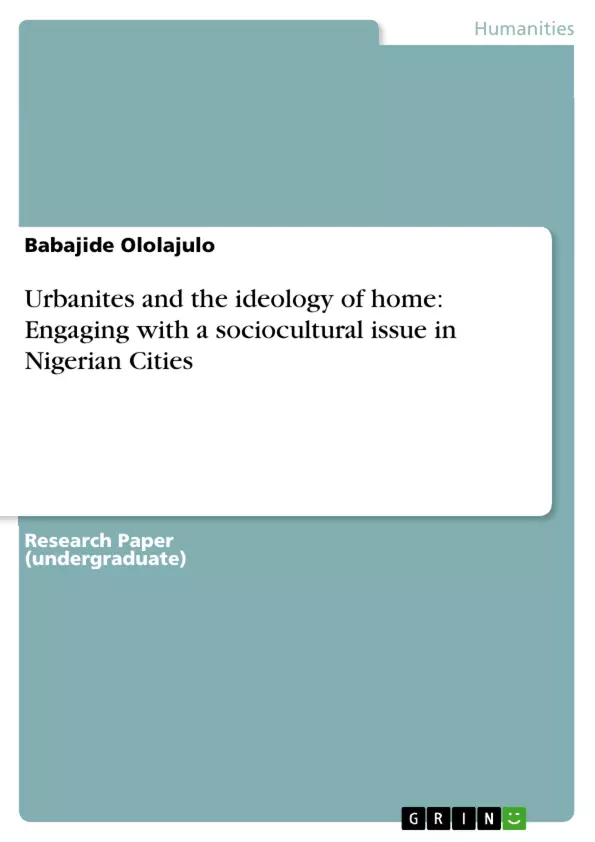This paper, through a qualitative study conducted in Ajegunle, an urban slum in Lagos, Nigeria, dwells on the notion of urbanism as a product of urban-rural interaction. It specifically focuses on the rural elements in the urban, explaining how the rural is exploited for creating the network that is crucial for social and economic survival in cities marked by impersonal relationship. The paper further examines the ideology of home, explicating on the factors that make urban dwellers to construct their identity mostly in rural terms. The paper concludes by reflecting on the strong allegiance of Nigerians to their rural origins and the implication of this for a sense of nationalism.
Inhaltsverzeichnis (Table of Contents)
- Urbanites and the Ideology of Home: Engaging with a Sociocultural Issue in Nigerian Cities
- Ethnographic Setting
- Urban-rural Interface
- Ajegunle: Home, Urban and Rural
- The Ideology of Home
Zielsetzung und Themenschwerpunkte (Objectives and Key Themes)
This chapter explores the complex relationship between urban and rural identities in Nigerian cities, specifically focusing on the experiences of urban dwellers in the Ajegunle slum of Lagos. The chapter aims to demonstrate that urbanism in Nigeria cannot be understood solely as a separate entity from the rural, but rather as a product of continuous interaction and connection.
- The dynamic interplay between urban and rural identities in contemporary Nigerian cities.
- The concept of "home" and its multifaceted meanings among urbanites in Ajegunle, Lagos.
- The impact of social networks and kinship ties in maintaining a sense of rural connection among urban residents.
- The role of historical and cultural contexts in shaping urban-rural relations in Nigeria.
- The evolving nature of urbanism in a globalized world, where traditional boundaries between cultures and spaces are increasingly blurred.
Zusammenfassung der Kapitel (Chapter Summaries)
The chapter begins by establishing the context of urbanization in Nigeria, highlighting the historical migration patterns and the socio-economic factors that have shaped the country's cities. It then focuses on Lagos, Nigeria's former capital, and Ajegunle, a densely populated slum, as case studies for understanding urban-rural relationships. The chapter explores the diverse ethnic composition of Ajegunle and the significance of kinship ties in maintaining connections to rural origins. It examines how the residents of Ajegunle navigate their identities as both urban dwellers and members of rural communities, illustrating the persistent influence of rural values and traditions in their lives.
Schlüsselwörter (Keywords)
Urbanism, rural identity, urban-rural interface, Ajegunle, Lagos, Nigeria, globalization, social networks, kinship ties, ethnoscapes, home, ideology, urban culture.
Frequently Asked Questions
What is the focus of the study on Ajegunle, Lagos?
The study explores how urban dwellers in the Ajegunle slum maintain strong ties to their rural origins and how this urban-rural interaction shapes their identity.
What does the "ideology of home" mean for Nigerian urbanites?
It refers to the tendency of city dwellers to define "home" as their ancestral rural village rather than the city where they currently live and work.
How do rural networks help people survive in the city?
Rural elements and kinship ties are exploited to create social and economic support networks that are crucial for survival in impersonal urban environments.
What role does globalization play in Nigerian urbanism?
Globalization blurs the boundaries between spaces, allowing urbanites to navigate "ethnoscapes" where traditional rural values coexist with global urban culture.
What are the implications of rural allegiance for Nigerian nationalism?
The paper reflects on how a strong primary allegiance to rural origins can complicate the development of a unified sense of national identity or nationalism.
- Quote paper
- Babajide Ololajulo (Author), 2011, Urbanites and the ideology of home: Engaging with a sociocultural issue in Nigerian Cities, Munich, GRIN Verlag, https://www.grin.com/document/184592



